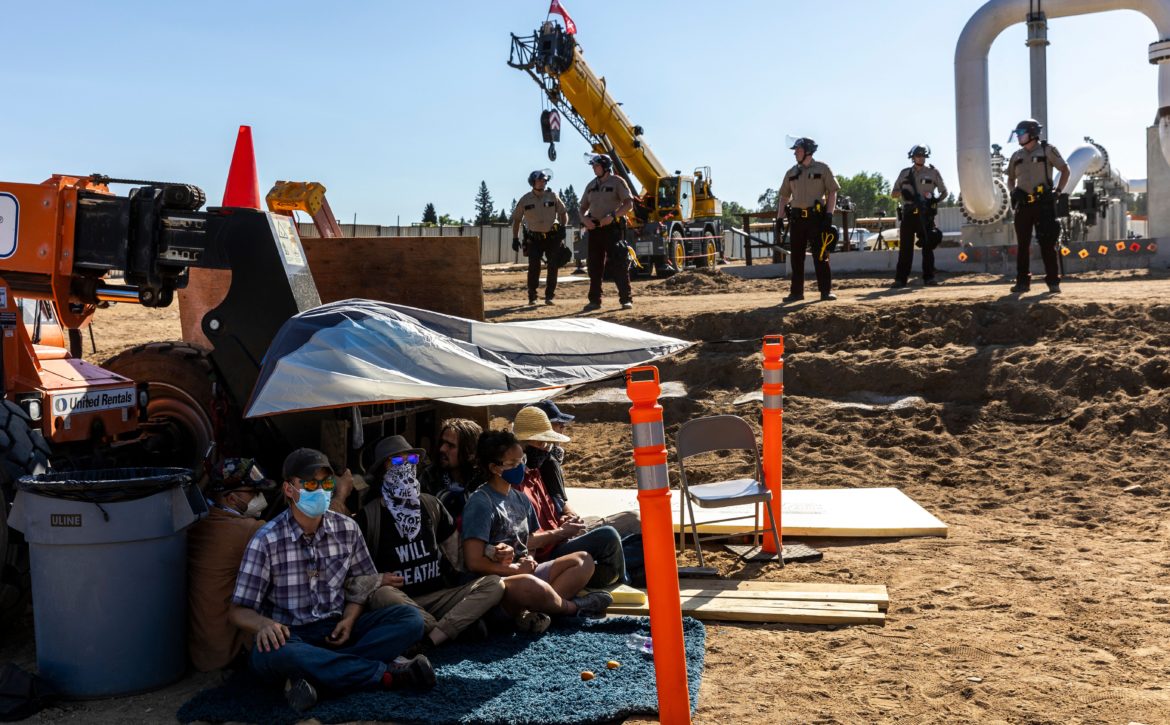
When Seas Burn and Governments Do Nothing, Community Action Is the Only Way
To summarize North American fossil fuel derangement, you only need two sentences: The Gulf of Mexico was on fire this weekend. On Monday, the company responsible got a new offshore drilling gig.Mexico’s state-owned utility company Petróleos Mexicanos, or Pemex, first noticed a leak in its subaqueous pipeline early Friday morning. A lightning strike then set the leak ablaze. The boats Pemex dispatched put out the fire after about four hours, after which, according to CBS News, the pipeline resumed “normal operating conditions.” Come Monday, Mexico’s energy ministry announced that Pemex had earned the right to drill one of the nation’s largest remaining offshore oil fields, much to the chagrin of the consortium of private companies that also wanted to extract from the same location.Federal government action to curb fossil fuel extraction is both deeply necessary and increasingly unlikely. Monday’s Pemex decision echoes a familiar pattern in the United States and Canada of rewarding poor results with bigger contracts and more ambitious operations. Companies and federal governments remain determined to squeeze out short-term victories for gas and oil interests. As my colleague Kate Aronoff wrote last week, Exxon’s apparent success in reducing the number of climate-related items in the Biden administration’s infrastructure package is yet another example of a government opting to satisfy those who plunged us into this mess. Where can people turn if the immediacy of the moment demands a more drastic response than our current political options afford?Individual action is a fraught concept these days—with good reason. The individualization of responsibility for climate change may be one of corporate America’s most sinister, and effective, marketing ploys, belonging in some hall of infamy alongside the ads from Big Tobacco claiming cigarettes help soothe scratchy throats. No single person can offset the inaction of presidents or Cabinet members or the executives at Chevron and Exxon. Those like myself who follow and report on national politics, however, can sometimes overstate federal authority as the be-all and end-all for emissions and climate change. While we do need national governments to act, individuals, when they band together as communities, have far more power than one might think.On Monday, oil pipeline company Plains All American announced that it will be shelving its plan to construct the Byhalia Connection pipeline, a project also sponsored by Valero that was slated to cut through Memphis on its way to Byhalia, Mississippi, where its oil would then be exported. In a statement, a spokesperson for Plains All American wrote that the decision was the result of “lower US oil production resulting from the Covid-19 pandemic.” But as Otis Sanford argued at Local 24 News, the pipeline also failed because the communities affected came together and said no.Byhalia Connection’s developers believed, based on decades of industry practice, that they could get away with slating an oil pipeline to run through several Black neighborhoods in southwest Memphis. A land agent working for the company reportedly even went as far as to admit that Plains All American constructed the route because the company believed it offered, “the point of least resistance.” In other words: Rich white political donors do not live there, making it the ideal location for an underground pipeline. But a group of citizens—Sanford names “Justin Pearson, Kizzy Jones, Kathy Robinson, and others who launched Memphis Community Against Pollution”—took a stand.In partnership with the Memphis-based environmental group Protect Our Aquifer, the communities filed lawsuits against Plains All American, pressured and petitioned Tennessee state agencies to rescind the pipeline’s permits, and advocated for their rights to live on unpolluted lands, until they organized their way into the national spotlight. “This community is standing up and saying no more, we’ve had enough,” Robinson told ABC News. “For the past 50 years, this specific community in Memphis has received whatever the rest of Memphis and Shelby County would dare not accept in other places.”This story is not an exception. Local, community-driven resistance has been one of the most effective ways to highlight and counter the cold ruthlessness of extractive outfits. It is the same approach that was taken by Black and Native communities throughout Virginia and North Carolina as Duke and Dominion Energy pulled strings within the state governments to try and force through the Atlantic Coast pipeline. It’s the same one being employed by Line 3 water protectors and allies in Minnesota.The Memphis victory, like the ACP victory, presents a possibility. Local and regional rejections of extractive energy production, particularly those of the fossil fuel variety, may currently be the best opportunity for communities within the U.S. to attain some semblance of environmental justice. That this is the case is an indictment of the current administration but also a testament to the power of communities, regardless of socioeconomic or political status. At present, projects like the Line 3, Line 5, Dakota Access, and Jordan Cove pipelines are, theoretically, one stroke of the president’s pen away from cancellation. But depending on career politicians to make difficult decisions in the name of environmental justice does not feel nearly as sustainable as the model implemented in Memphis.Certainly, community-driven responses sans federal assistance have their limits: Community action couldn’t have stopped the fire in the Gulf this past weekend. Our governments should already be working alongside our communities, not against them. But until that happens, neighborhoods banding together to stand up for themselves may be our best shot.
Read More


